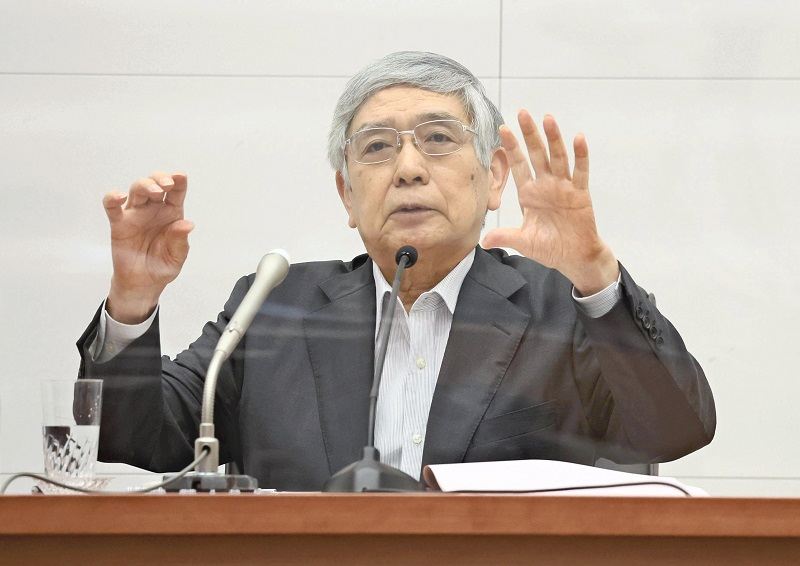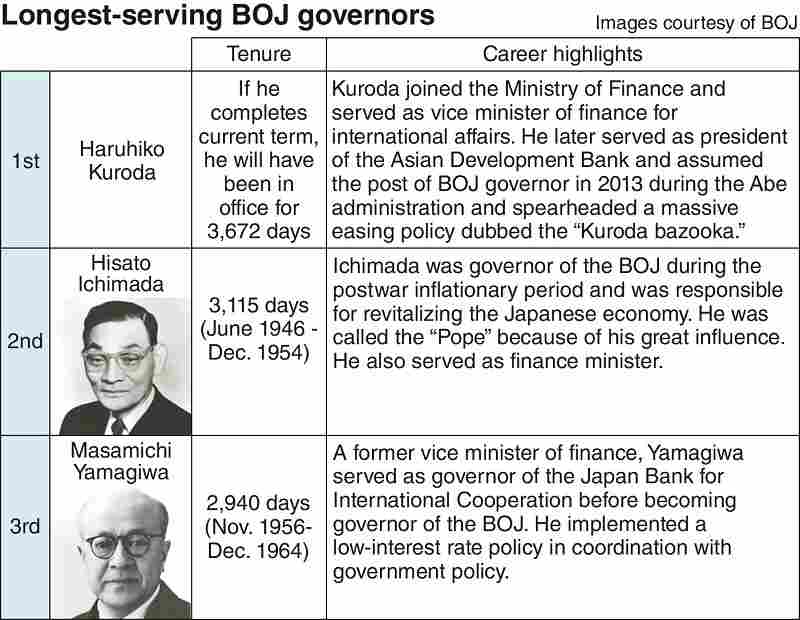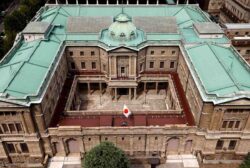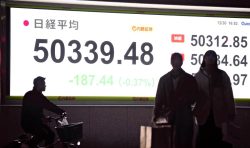
Bank of Japan Gov. Haruhiko Kuroda speaks at a press conference at the BOJ’s head office in Chuo Ward, Tokyo, on Sept. 27.
10:10 JST, October 6, 2021
Bank of Japan Gov. Haruhiko Kuroda has become the longest-serving chief in the central bank’s history.
As of Sept. 29, Kuroda had served 3,116 days in the role, surpassing the previous record set by Hisato Ichimada in 1954.
Under his tenure, the BOJ has pursued an audacious monetary easing program to tackle deflation and stimulate the Japanese economy, with aggressive asset-buying that has helped lift stock prices and correct a strong yen that had weighed on automakers and other exporters.
But the long-term side effects of these policies remain to be seen, as concerns mount over challenges faced by financial institutions whose earnings have been squeezed by years of ultra-low interest rates.
‘Kuroda bazooka’
On Sept. 27, Kuroda held a press conference at the BOJ’s head office, on the eve of matching Ichimada’s longevity record.
Fresh from online discussions with officials from business groups in the Kansai region earlier in the day, Kuroda reiterated to reporters that his responsibility was “to do my utmost to achieve the goal of raising the inflation rate to 2%.”
Kuroda assumed the post of governor in March 2013, two months after the government and the BOJ set the inflation target at 2%. Yet the inflation rate has yet to hit this target, excluding the direct effects of the consumption tax hike.
At the press conference, Kuroda said he thinks it will be “difficult” to achieve the goal by April 2023, when his current term is set to expire. On the other hand, he said, “[The easing measures taken so far] are not wrong” and emphasized the tangible effects the measures have had on economic growth and rising prices.
Kuroda has implemented a series of monetary easing policies with 2% inflation as his top priority.
In the month following his inauguration, he rolled out a “quantitative and qualitative monetary easing” program, that sought to increase the money supply by buying up massive amounts of financial assets such as long-term Japanese government bonds and exchange-traded funds (ETF).
The unprecedented cash stimulus was hailed in financial markets as the “Kuroda bazooka.”
Long-term interest
In February 2016, the BOJ launched a negative interest rate policy, which aimed to lower the interest rates at which companies and individuals borrow money.
But the negative interest rate policy pushed down interest rates more than expected, stinging financial institutions that had been profiting from loan margins and other sources.
In September that year, the BOJ adopted a “yield curve control” as a remedial measure to guide the 10-year Japanese government debt yield to around 0% in an effort to stabilize low interest rates.
The policy was without precedent on the global stage.
Central banks in the U.S. and Europe have been exploring scaling back asset purchases and other exist strategies from monetary easing policies implemented to tackle economic slump caused by the novel coronavirus crisis.
In contrast, Kuroda’s BOJ is expected to continue its massive easing policy, as its goal of achieving 2% inflation rate is far from reality.
This year, the benchmark Nikkei Stock Average has repeatedly surpassed the 30,000 level, setting and then breaking new post-bubble highs.
Large-scale monetary easing has been an engine that has driven the Japanese economy, kept the unemployment rate as low as the 2% range and boosted corporate capital spending.
Meanwhile, interest rates have hovered around negative territory in the short term and near zero in the long term — far below the 1.5% seen in the latest long-term interest rates in the U.S., which similarly implemented monetary easing policies.
Banks still face a harsh climate in Japan, at a time when long-term interest rates continue to be manipulated by the BOJ and gradually lose their former standing as an “economic barometer.”
Sink or swim
If Kuroda serves his current term to completion in April 2023, he will become the only BOJ governor to hold office for more than 10 years.
In the postwar era, only two other BOJ chiefs have served two terms or more — Ichimada and Masamichi Yamagiwa.
Ichimada was dubbed the “Pope” due to his influence in controlling rampant inflation during the postwar reconstruction era. After stepping down from the bank, he went on to serve as finance minister.
Yamagiwa was a former bureaucrat in the Ministry of Finance. After joining the bank, he similarly stewarded low interest rate policies in conjunction with the government’s income doubling plan, as the third-longest serving BOJ governor.
Having assumed the governorship during the second Abe Cabinet, Kuroda played a key role in the “Abenomics” economic stimulus strategy.
On the same day that Kuroda set his tenure record, the Liberal Democratic Party selected Fumio Kishida as their new president to replace Prime Minister Yoshihide Suga, who had carried on the Abenomics mantle.
Kishida has indicated that he supports continuing large-scale monetary easing.
In Kuroda’s remaining time at the helm of the BOJ, he will have to navigate the turbulent waters that swirl around the undecided legacy of large-scale monetary relaxation.

An illustration : Longest-serving BOJ governors (Images courtesy of BOJ)
Top Articles in Business
-

Prudential Life Insurance Plans to Fully Compensate for Damages Caused by Fraudulent Actions Without Waiting for Third-Party Committee Review
-

Narita Airport, Startup in Japan Demonstrate Machine to Compress Clothes for Tourists to Prevent People from Abandoning Suitcases
-

Japan, U.S. Name 3 Inaugural Investment Projects; Reached Agreement After Considerable Difficulty
-

JR Tokai, Shizuoka Pref. Agree on Water Resources for Maglev Train Construction
-

Toyota Motor Group Firm to Sell Clean Energy Greenhouses for Strawberries
JN ACCESS RANKING
-

Japan PM Takaichi’s Cabinet Resigns en Masse
-

Japan Institute to Use Domestic Commercial Optical Lattice Clock to Set Japan Standard Time
-

Israeli Ambassador to Japan Speaks about Japan’s Role in the Reconstruction of Gaza
-

Man Infected with Measles Reportedly Dined at Restaurant in Tokyo Station
-

Videos Plagiarized, Reposted with False Subtitles Claiming ‘Ryukyu Belongs to China’; Anti-China False Information Also Posted in Japan






















